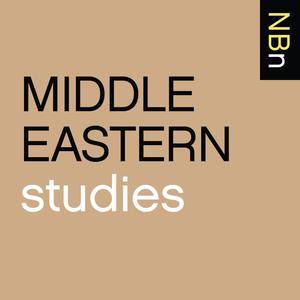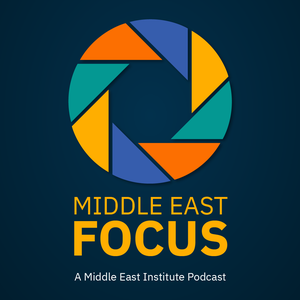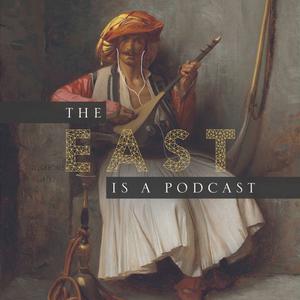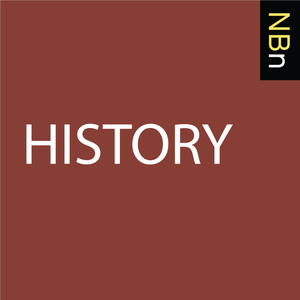
New Books in Middle Eastern Studies
Interviews with Scholars of the Middle East about their New Books
- 1 hour 3 minutesSari Nusseibeh, "Avicenna's Al-Shifā': Oriental Philosophy" (Routledge, 2018)
Sari Nusseibeh's book Avicenna's Al-Shifā': Oriental Philosophy (Routledge, 2018) deals with the philosophy of Ibn Sina - Avicenna as he was known in the Latin West- a Persian Muslim who lived in the eleventh century, considered one of the most important figures in the history of philosophy.
Although much has been written about Avicenna, and especially about his major philosophical work, Al-Shifa, this book presents the rationalist Avicenna in an entirely new light, showing him to have presented a theory where our claims of knowledge about the world are in effect just that, claims, and must therefore be underwritten by our faith in God. His project enlists arguments in psychology as well as in language and logic. In a sense, the ceiling he puts on the reach of reason can be compared with later rationalists in the Western tradition, from Descartes to Kant -though, unlike Descartes, he does not deem it necessary to reconstruct his theory of knowledge via a proof of the existence of God. Indeed, Avicenna's theory presents the concept of God as being necessarily presupposed by our theory of knowledge, and God as the Necessary Being who is presupposed by an existing world where nothing of itself is what it is by an intrinsic nature, and must therefore be as it is due to an external cause. The detailed and original analysis of Avicenna's work here is presented as what he considered to be his own, or 'oriental' philosophy.
Presenting an innovative interpretation of Avicenna's thought, this book will appeal to scholars working on classical Islamic philosophy, kalām and the History of Logic.
Learn more about your ad choices. Visit megaphone.fm/adchoices
Support our show by becoming a premium member! https://newbooksnetwork.supportingcast.fm/middle-eastern-studies
16 May 2024, 8:00 am - 47 minutes 26 secondsLisa Bhungalia, "Elastic Empire: Refashioning War Through Aid in Palestine" (Stanford UP, 2023)
The United States integrated counterterrorism mandates into its aid flows in the West Bank and Gaza Strip during the early years of the global war on terror. Some two decades later, this securitized model of aid has become normalized across donor intervention in Palestine. Elastic Empire: Refashioning War Through Aid in Palestine (Stanford UP, 2023) traces how foreign aid, on which much of the Palestinian population is dependent, has multiplied the sites and means through which Palestinian life is regulated, surveilled, and policed—this book tells the story of how aid has also become war.
Drawing on extensive research conducted in Palestine, Elastic Empire offers a novel accounting of the US security state. The US war chronicled here is not one of tanks, grenades, and guns, but a quieter one waged through the interlacing of aid and law. It emerges in the infrastructures of daily life—in a greenhouse and library, in the collection of personal information and mapping of land plots, in the halls of municipal councils and in local elections—and indelibly transfigures lives. Situated in a landscape where the lines between humanitarianism and the global war on terror are increasingly blurred, Elastic Empire reveals the shape-shifting nature of contemporary imperial formations, their realignments and reformulations, their haunted sites, and their obscured but intimate forms.
Lisa Bhungalia is Assistant Professor of Geography at Kent State University. Her new position (as of fall 2024) will be Assistant Professor of Geography and International Studies at the University of Wisconsin-Madison.
Learn more about your ad choices. Visit megaphone.fm/adchoices
Support our show by becoming a premium member! https://newbooksnetwork.supportingcast.fm/middle-eastern-studies
15 May 2024, 8:00 am - 53 minutes 45 secondsJosé Ciro Martínez, "States of Subsistence: The Politics of Bread in Contemporary Jordan" (Stanford UP, 2022)
In 1974 the government of Jordan established a new ministry to oversee a nationwide scheme to buy and distribute subsidized flour and regulate bakeries. The scheme sets terms for the politics that are the subject of a new book: States of Subsistence: The Politics of Bread in Contemporary Jordan (Stanford University Press, 2022). Rest assured, this is no dull account of state welfare that posits and tests for a two-dimensional relationship between the delivery of a staple food and public acquiescence to authoritarian rule. Far from it! To explain these politics, José Ciro Martínez goes to work baking, and taking the reader through kitchens, byways and marketplaces. Via descriptions of bakers and regulators, and interviews with consumers and policymakers, he offers a sophisticated account of how the state meets the stomach in Jordan, and how both citizens and bureaucracy are changed through this intra-action.
States of Subsistence was the winner of the 2023 Roger Owen Book Award, sponsored by the Middle East Studies Association, and singled out for an honourable mention by the 2023 Charles Taylor Book Award committee of the American Political Science Association’s Interpretive Methodologies and Methods Group.
If you like this episode of New Books in Interpretive Political and Social Science then you might also be interested in Mona El Ghobashy on Bread and Freedom: Egypt’s Revolutionary Situation, or Gerard McCarthy on Outsourcing the Polity: Non-state Welfare, Inequality and Resistance in Myanmar.
José’s book recommendations are:
- Teo Ballvé, The Frontier Effect: State Formation and Violence in Colombia
- Lauren Berlant, On the Inconvenience of Other People
- Hisham Matar, My Friends
Learn more about your ad choices. Visit megaphone.fm/adchoices
Support our show by becoming a premium member! https://newbooksnetwork.supportingcast.fm/middle-eastern-studies
15 May 2024, 8:00 am - 30 minutes 47 secondsWhat does Biden’s temporary suspension of offensive arms transfers mean for US-Israeli relations?
Charles Blaha, a former State Department expert on the vetting of U.S. weapons transfers to other countries, helps us understand this important moment in the Israel-Hamas conflict. After an extended period of tension between U.S President Joe Biden and Israeli Prime Minister Benjamin Netanyahu, Biden has decided to freeze some transfers of weapons to Israel, at least temporarily. In his conversation with RBI director John Torpey, Blaha explains United States law and policy governing weapons transfers, which imposes stringent controls to avoid the misuse of U.S. weaponry. Blaha also discusses the role of the protests on campuses and their doubtful effects on changing American or Israeli policy. Finally, the conversation delves into the overall posture of the United States vis-à-vis arms transfers to Israel.
Learn more about your ad choices. Visit megaphone.fm/adchoices
Support our show by becoming a premium member! https://newbooksnetwork.supportingcast.fm/middle-eastern-studies
13 May 2024, 8:00 am - 40 minutes 50 secondsYasmine Ramadan, "Space in Modern Egyptian Fiction" (Edinburgh UP, 2021)
In 1960s Egypt, a group of writers exploded onto the literary scene, transforming the aesthetic landscape. Yasmine Ramadan’s Space in Modern Egyptian Fiction (Edinburgh University Press, 2021) explores how this literary generation presents a marked shift in the representation of rural, urban, and exilic space, reflecting a disappointment with the project of the postcolonial nation-state in Egypt. Combining a sociological approach to literature with detailed close readings, Yasmine Ramadan explores the spatial representations that embodied this shift within the Egyptian literary scene and the disappearance of an idealized nation in the Egyptian novel. Space in Modern Egyptian Fiction provides a robust examination of the emergence and establishment of some of the most significant writers in modern Egyptian literature and their influence across six decades while tracing the social, economic, political, and aesthetic changes that marked this period in Egypt's contemporary history.
In this episode, Ibrahim Fawzy interviews Yasmine Ramadan about the representations of Cairo, Alexandria, Upper Egypt, Europe, and the Gulf in modern Egyptian fiction.
Ibrahim Fawzy is a literary translator and academic based in Egypt. His interests include translation studies, Arabic literature, ecocriticism, and disability studies.
Learn more about your ad choices. Visit megaphone.fm/adchoices
Support our show by becoming a premium member! https://newbooksnetwork.supportingcast.fm/middle-eastern-studies
12 May 2024, 8:00 am - 1 hour 6 minutesGörkem Akgöz, "In the Shadow of War and Empire: Industrialisation, Nation-Building, and Working-Class Politics in Turkey" (Brill, 2023)
In the Shadow of War and Empire: Industrialisation, Nation-Building, and Working-Class Politics in Turkey (Brill, 2023) offers a site-specific history of Ottoman and Turkish industrialization through the lens of a mid-nineteenth-century cotton factory in the “Turkish Manchester,” the name chosen by the Ottomans for the industrial complex they built in the 1840s in Istanbul, which, in the contemporary words of one of the country’s most prominent contemporary Marxist theorists, became “the secret to and the basis of Turkish capitalism" in the 1930s.
This book is available open access here.
Görkem Akgöz is is a post-doc researcher at Humboldt University and a lecturer at Albert-Ludwigs-University Freiburg.
Caleb Zakarin is editor at the New Books Network.
Learn more about your ad choices. Visit megaphone.fm/adchoices
Support our show by becoming a premium member! https://newbooksnetwork.supportingcast.fm/middle-eastern-studies
12 May 2024, 8:00 am - 41 minutes 24 secondsHala Auji et al., "The Arab Nahda as Popular Entertainment: Mass Culture and Modernity in the Middle East" (I. B. Tauris, 2023)
What was popular entertainment like for everyday Arab societies in Middle Eastern cities during the long nineteenth century? In what ways did café culture, theatre, illustrated periodicals, cinema, cabarets, and festivals serve as key forms of popular entertainment for Arabic-speaking audiences, many of whom were uneducated and striving to contend with modernity's anxiety-inducing realities?
Studies on the 19th to mid-20th century's transformative cultural movement known as the Arab nahda (renaissance), have largely focused on concerns with nationalism, secularism, and language, often told from the perspective of privileged groups. Highlighting overlooked aspects of this movement, this book shifts the focus away from elite circles to quotidian audiences. Its ten contributions range in scope, from music and visual media to theatre and popular fiction. Paying special attention to networks of movement and exchange across Arab societies in Lebanon, Syria, Egypt, Iraq, and Morocco, The Arab Nahda as Popular Entertainment: Mass Culture and Modernity in the Middle East (I. B. Tauris, 2023) heeds the call for 'translocal/transnational' cultural histories, while contributing to timely global studies on gender, sexuality, and morality. Focusing on the often-marginalized frequenters of cafés, artist studios, cinemas, nightclubs, and the streets, it expands the remit of who participated in the nahda and how they did.
Raphael Cormack is an assistant professor of Arabic at the Durham University. He was previously a visiting researcher at Columbia University in the City of New York and holds a PhD from the University of Edinburgh. His most recent publication was Midnight in Cairo: The Divas of Egypt’s Roaring 20s (2021). He has also edited two collections of Arabic short stories translated into English, The Book of Khartoum and The Book of Cairo.
Learn more about your ad choices. Visit megaphone.fm/adchoices
Support our show by becoming a premium member! https://newbooksnetwork.supportingcast.fm/middle-eastern-studies
10 May 2024, 8:00 am - 36 minutes 16 secondsDavid Tal, "The Making of an Alliance: The Origins and Development of the US-Israel Relationship" (Cambridge UP, 2022)
Laying the foundation for an understanding of US-Israeli relations, this lively and accessible book provides critical background on the origins and development of the 'special' relations between Israel and the United States.
Questioning the usual neo-realist approach to understanding this relationship, David Tal instead suggests that the relations between the two nations were constructed on idealism, political culture, and strategic ties.
Based on a diverse range of primary sources collected in archives in both Israel and the United States, The Making of an Alliance: The Origins and Development of the US-Israel Relationship (Cambridge UP, 2022) discusses the development of relations built through constant contact between people and ideas, showing how presidents and Prime Ministers, state officials, and ordinary people from both countries, impacted one another. It was this constancy of religion, values, and history, serving the bedrock of the relations between the two countries and peoples, over which the ephemeral was negotiated.
The author, David Tal, is Professor and Yossi Harel Chair in Modern Israel Studies in the Department of History at the University of Sussex. A historian of diplomatic and military history, he has published extensively on Israeli diplomatic and military history, and U.S. diplomatic history and disarmament policies.
Learn more about your ad choices. Visit megaphone.fm/adchoices
Support our show by becoming a premium member! https://newbooksnetwork.supportingcast.fm/middle-eastern-studies
8 May 2024, 8:00 am - 49 minutes 1 secondSami Hermez with Sireen Sawalha, "My Brother, My Land: A Story from Palestine" (Redwood Press, 2024)
My Brother, My Land: A Story from Palestine (Redwood Press, 2024) is a riveting and unapologetic account of Palestinian resistance, the story of one family's care for their land, and a reflection on love and heartache while living under military occupation.
In 1967, Sireen Sawalha's mother, with her young children, walked back to Palestine against the traffic of exile. My Brother, My Land is the story of Sireen's family in the decades that followed and their lives in the Palestinian village of Kufr Ra'i. From Sireen's early life growing up in the shadow of the '67 War and her family's work as farmers caring for their land, to the involvement of her brother Iyad in armed resistance in the First and Second Intifada, Sami Hermez, with Sireen Sawalha, crafts a rich story of intertwining voices, mixing genres of oral history, memoir, and creative nonfiction.
Through the lives of the Sawalha family, and the story of Iyad's involvement with the Palestinian Islamic Jihad, Hermez confronts readers with the politics and complexities of armed resistance and the ethical tensions and contradictions that arise, as well as with the dispossession and suffocation of people living under occupation and their ordinary lives in such times. Whether this story leaves readers discomforted, angry, or empowered, they will certainly emerge with a deeper understanding of the Palestinian predicament.
Sami Hermez is an anthropologist and teaches at Northwestern University in Qatar. He is the author of War Is Coming: Between Past and Future Violence in Lebanon (2017). His work in and out of the classroom reflects a strong commitment to freedom, justice, and equality. His family's history of migration spans the Levant, with roots in Al-Qosh, Aleppo, Beirut, and Jerusalem. Sami lives in Doha with his family.
SIREEN SAWALHA, born in the small village of Kufr Rai in Jenin, Palestine, comes from a family deeply connected to the region's rich history. She moved to the US in 1990 and completed her Bachelor's and Master's degrees at Rider University. Recognized by Cornell University for her outstanding contributions to education in 2022, Sireen serves as a social studies teacher in New Jersey. Beyond academia, she is a passionate chef and compelling storyteller, sharing her family's experiences under occupation. Sireen raises awareness about Palestinian culture and actively contributes to the struggle for Palestinian freedom. My Brother, My Land is the story of her family.
Learn more about your ad choices. Visit megaphone.fm/adchoices
Support our show by becoming a premium member! https://newbooksnetwork.supportingcast.fm/middle-eastern-studies
7 May 2024, 8:00 am - 1 hour 6 minutesSalar Mameni, "Terracene: A Crude Aesthetics" (Duke UP, 2023)
In Terracene: A Crude Aesthetics (Duke UP, 2023), Salar Mameni historicizes the popularization of the scientific notion of the Anthropocene alongside the emergence of the global war on terror. Mameni theorizes the Terracene as an epoch marked by a convergence of racialized militarism and environmental destruction. Both the Anthropocene and the war on terror centered the antagonist figures of the Anthropos and the terrorist as responsible for epochal changes in the new geological and geopolitical world orders. In response, Mameni shows how the Terracene requires radically new engagements with terra (the earth), whose intelligence resides in matters such as oil and phenomena like earthquakes and fires. Drawing on the work of artists whose practices interrogate histories of settler-colonial and imperial interests in land and resources in Iran, Iraq, Yemen, Kuwait, Syria, Palestine, and other regions most affected by the war on terror, Mameni offers speculative paths into the aesthetics of the Terracene.
Salar Mameni is an art historian specializing in contemporary transnational art and visual culture in the Arab/Muslim world with an interdisciplinary research on racial discourse, transnational gender politics, militarism, oil cultures and extractive economies in West Asia. Mameni has published articles in Signs, Women & Performance, Al-Raida Journal, Fuse Magazine, Fillip Review and Canadian Art Journal, and has written for exhibition catalogues in Dubai, Sharjah and Istanbul. Mameni was the curator of “Snail Fever,” at the Third Line Gallery in Dubai that explored art as a pandemic bringing together artists from the region whose works consider the embodied, viral and contaminating nature of sonic and visual aesthetics.
Najwa Mayer is an interdisciplinary cultural scholar of race, gender, sexuality, and Islam in/and the United States, working at the intersections of politics, aesthetics, and critical theory. She is currently a Society of Fellows Postdoctoral Scholar at Boston University.
Learn more about your ad choices. Visit megaphone.fm/adchoices
Support our show by becoming a premium member! https://newbooksnetwork.supportingcast.fm/middle-eastern-studies
5 May 2024, 8:00 am - 1 hour 7 minutesZahra Ayubi, "Gendered Morality: Classical Islamic Ethics of the Self, Family, and Society" (Columbia UP, 2019)
How are notions of justice and equality constructed in Islamic virtue ethics (akhlaq)? How are Islamic virtue ethics gendered, despite their venture into perennial concerns of how best to live a good and ethical life? These are the questions that Zahra Ayubi, an assistant professor of religion at Dartmouth college, examines in her new book Gendered Morality: Classical Islamic Ethics of the Self, Family, and Society (Columbia University Press, 2019). Using akhlaq literature by al-Ghazali, Davani and Tusi, Ayubi closely studies the ways in which these male Muslim scholars constructed ideas of the self (nafs), particularly in relation to the family and the society. Despite the ethicists’ differing sectarian and theological orientations in Islam, they still concluded that the status of a perfect ethical human was only achievable by a male elite. Meaning that the capacity to utilize rational faculty, which is central to self-refinement, was deemed not accessible to females, slaves, and non-elite males. In unpacking these gendered and hierarchical dynamics around ethics and comportment, Aybui masterfully applies feminist and gender analysis to deconstruct ethical texts. In light of her findings, she calls for a “philosophical turn” that must employ critical gender analysis when reading these texts not only in the context of Islamic philosophy, but broadly in the study of Islam. The book is a must read for scholars and students interested in Islamic philosophy and gender and Islamic studies.
M. Shobhana Xavier is an Assistant Professor of Religion at Queen’s University. Her research areas are on contemporary Sufism in North America and South Asia. She is the author of Sacred Spaces and Transnational Networks in American Sufism(Bloombsury Press, 2018) and a co-author of Contemporary Sufism: Piety, Politics, and Popular Culture (Routledge, 2017). More details about her research and scholarship may be found on here and here. She may be reached at [email protected].
Learn more about your ad choices. Visit megaphone.fm/adchoices
Support our show by becoming a premium member! https://newbooksnetwork.supportingcast.fm/middle-eastern-studies
4 May 2024, 8:00 am - More Episodes? Get the App
Your feedback is valuable to us. Should you encounter any bugs, glitches, lack of functionality or other problems, please email us on [email protected] or join Moon.FM Telegram Group where you can talk directly to the dev team who are happy to answer any queries.
 The President’s Inbox
The President’s Inbox
 Middle East Focus
Middle East Focus
 The East is a Podcast
The East is a Podcast
 New Books in History
New Books in History
 New Books in Islamic Studies
New Books in Islamic Studies
 The Brookings Cafeteria
The Brookings Cafeteria